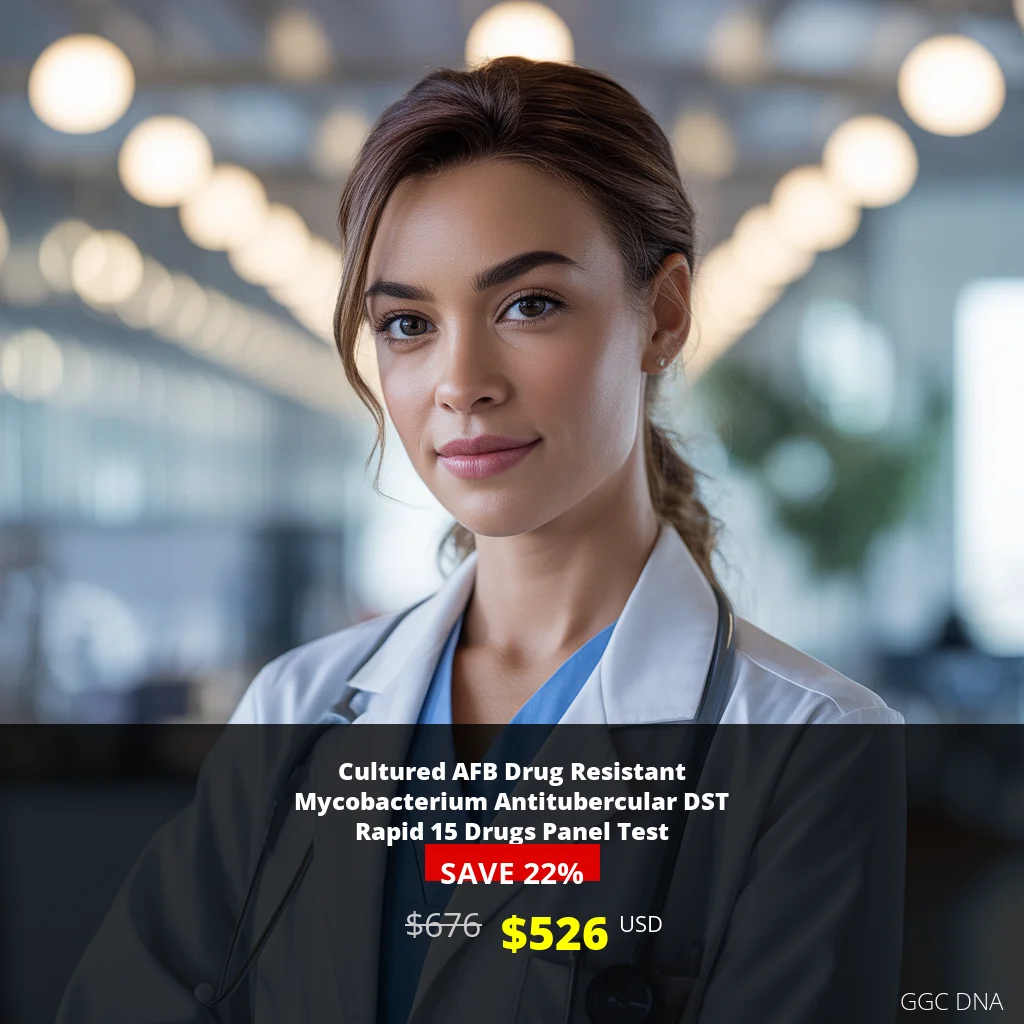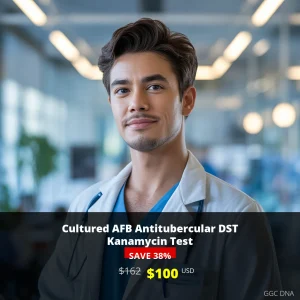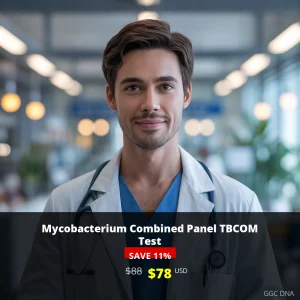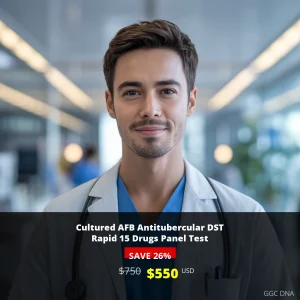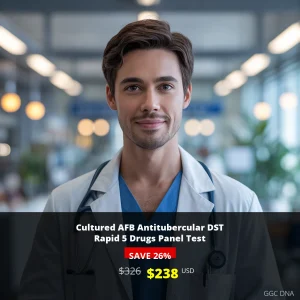Cultured AFB Drug Resistant Mycobacterium Antitubercular DST Rapid 15 Drugs Panel Test
Comprehensive Introduction to Drug Susceptibility Testing
The Cultured AFB Drug Resistant Mycobacterium Antitubercular DST Rapid 15 Drugs Panel Test represents a groundbreaking advancement in tuberculosis diagnostics. This sophisticated laboratory analysis plays a crucial role in the global fight against drug-resistant tuberculosis, which has emerged as a significant public health challenge worldwide. By providing detailed information about which anti-tuberculosis medications will be effective against specific bacterial strains, this test enables healthcare providers to design targeted treatment strategies that maximize therapeutic success while minimizing side effects and treatment duration.
Tuberculosis remains one of the world’s deadliest infectious diseases, and the rise of drug-resistant strains has complicated treatment protocols significantly. Our comprehensive 15-drug panel test utilizes state-of-the-art automated fluorescent technology to deliver precise, reliable results that guide clinical decision-making. The importance of this testing cannot be overstated—it directly impacts patient outcomes, reduces transmission rates, and helps prevent the development of further drug resistance through inappropriate medication selection.
What This Advanced Test Measures and Detects
This comprehensive drug susceptibility test evaluates Mycobacterium tuberculosis complex strains for resistance patterns across 15 critical anti-tuberculosis medications:
- First-line drugs: Streptomycin, Isoniazid, Rifampicin, Ethambutol, Pyrazinamide
- Second-line injectables: Capreomycin, Kanamycin, Amikacin
- Fluoroquinolones: Levofloxacin, Moxifloxacin
- Other second-line agents: Clofazimine, Ethionamide, PAS (Para-aminosalicylic acid), Cycloserine, Linezolid
The test employs automated fluorescent technology to detect bacterial growth in the presence of various drug concentrations, providing quantitative data about minimum inhibitory concentrations (MICs). This sophisticated approach allows for precise determination of resistance levels, helping clinicians understand not just whether resistance exists, but to what degree. The comprehensive nature of this 15-drug panel ensures that physicians have a complete picture of the bacterial strain’s susceptibility profile, enabling them to select the most effective combination therapy.
Who Should Consider This Critical Diagnostic Test
This advanced drug susceptibility testing is particularly important for several patient populations:
Patients with Treatment Failure or Relapse
Individuals who have not responded adequately to standard tuberculosis treatment regimens or who have experienced disease recurrence after completing therapy should undergo comprehensive drug susceptibility testing. This helps identify acquired resistance that may have developed during previous treatment courses.
Contacts of Drug-Resistant TB Cases
People who have been in close contact with individuals diagnosed with drug-resistant tuberculosis should be evaluated with this comprehensive panel to rule out infection with resistant strains and ensure appropriate prophylactic or treatment measures if infection is confirmed.
High-Risk Populations
Patients from regions with high rates of drug-resistant tuberculosis, immunocompromised individuals, and those with specific risk factors for drug resistance should consider this testing to ensure their treatment plan is optimally tailored to their specific infection.
Symptoms Warranting Testing
- Persistent cough lasting more than three weeks
- Unexplained weight loss and fatigue
- Night sweats and fever
- Chest pain and breathing difficulties
- Coughing up blood or sputum
- Failure to improve on standard TB treatment
Significant Benefits of Comprehensive Drug Susceptibility Testing
Undergoing this advanced diagnostic testing provides numerous advantages for both patients and healthcare providers:
Personalized Treatment Planning
The detailed resistance profile obtained from this 15-drug panel enables physicians to design highly specific treatment regimens that target the patient’s unique bacterial strain. This personalized approach increases treatment success rates while reducing unnecessary medication exposure.
Reduced Treatment Duration
By identifying the most effective medications from the outset, patients can avoid the trial-and-error approach that often prolongs treatment. This leads to shorter overall treatment courses and faster recovery times.
Prevention of Further Resistance
Using ineffective medications not only fails to treat the infection but can promote the development of additional drug resistance. This test helps prevent this dangerous progression by ensuring only effective drugs are used.
Cost-Effective Healthcare
While the initial test represents an investment, it ultimately saves healthcare costs by avoiding prolonged ineffective treatments, hospitalizations, and management of treatment complications.
Public Health Protection
Rapid identification and appropriate treatment of drug-resistant tuberculosis cases helps prevent transmission to others in the community, contributing to broader public health safety.
Understanding Your Test Results
Interpreting drug susceptibility test results requires specialized medical expertise, but understanding the basic concepts can help patients participate more actively in their care:
Susceptibility Categories
Results typically categorize each tested drug as “susceptible,” “intermediate,” or “resistant.” Susceptible indicates the drug is likely to be effective, resistant means the drug will not work against the specific strain, and intermediate suggests the drug may work at higher doses or in combination with other agents.
Treatment Implications
Your physician will use these results to construct a regimen using multiple drugs to which your strain shows susceptibility. This multi-drug approach is essential to prevent the development of further resistance and ensure complete bacterial eradication.
Follow-up Considerations
Regular monitoring during treatment is crucial, and repeat testing may be recommended if treatment response is suboptimal or if new symptoms develop during therapy.
Test Details and Pricing
| Test Parameter | Details |
|---|---|
| Test Name | Cultured AFB Drug Resistant Mycobacterium Antitubercular DST Rapid 15 Drugs Panel Test |
| Regular Price | $676 USD |
| Discount Price | $526 USD |
| Turnaround Time | Sample Daily by 3:30 pm; Report 21 days |
| Sample Type | Submit pure growth of Mycobacterium tuberculosis complex on appropriate media in sterile screw capped container in a sealed plastic bag. Ship refrigerated OR when used with other AFB culture or Mycobacteria identification tests, the pure growth obtained in the laboratory from specimens already submitted will be processed for Antitubercular sensitivity. |
| Methodology | Automated Fluorescent |
| Test Components | Streptomycin, Isoniazid, Rifampicin, Ethambutol, Pyrazinamide, Clofazimine, Ethionamide, Capreomycin, Kanamycin, Amikacin, PAS, Cycloserine, Levofloxacin, Moxifloxacin, Linezolid |
| Pre-test Instructions | No special preparation required |
Nationwide Accessibility and Booking Information
GGC DNA maintains testing facilities across the United States, ensuring convenient access to this critical diagnostic service in major metropolitan areas including New York, Los Angeles, Chicago, Houston, Phoenix, Philadelphia, San Antonio, San Diego, Dallas, San Jose, and many other cities. Our network of certified laboratories adheres to the highest standards of quality and accuracy.
To schedule your Cultured AFB Drug Resistant Mycobacterium Antitubercular DST Rapid 15 Drugs Panel Test or to discuss your testing needs with our medical professionals, please contact us at +1(267) 388-9828. Our knowledgeable staff is available to answer your questions, explain the testing process, and help you coordinate sample collection and transportation if needed.
Take control of your tuberculosis treatment today with comprehensive drug susceptibility testing that provides the detailed information necessary for effective, personalized care. Early and accurate identification of drug resistance patterns can significantly improve treatment outcomes and help prevent the spread of resistant tuberculosis strains in our communities.

